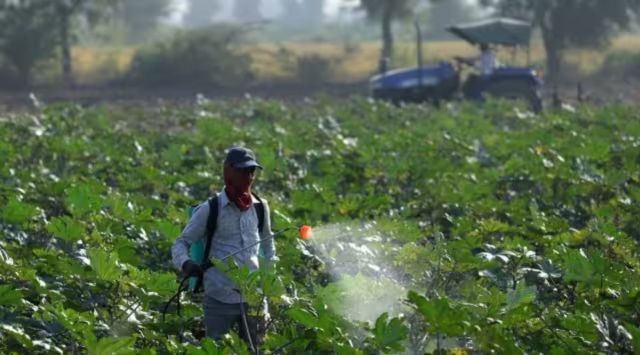After floods, pest attack: For paddy farmers, struggle far from over
This year, Punjab has sown paddy on 32 lakh hectares, including approximately 5.96 lakh hectares of basmati varieties.
 Experts attribute BPH and other infestations to high humidity levels during the grain-filling stage. (Express File Photo)
Experts attribute BPH and other infestations to high humidity levels during the grain-filling stage. (Express File Photo) After floods, now pest attack. For farmers in Punjab, especially those who have opted for paddy, the kharif season this year is turning out to be challenging.
In July, rains flooded a vast expanse of land, damaging paddy and basmati crops over 2 lakh acres. In August, the monsoon fury in Himachal Pradesh led the authorities to release excess water from Bhakra and Pong dams, resulting in vast agricultural fields remaining completely underwater in Punjab for days. Now, in September, the crop, especially paddy, is facing attack from various pests, with the problem being acute in Malerkotla, Sangrur, Nabha and in some villages of Moga district.
Farmers are grappling with the attack of pests like Patta Lapet (Rice Leaf Fold Insect); Gobh Sundi – also known as the rice whorl maggot or white step borer – a common pest that infests paddy crops causing considerable damage to yield and quality; and Brown Plant Hopper (BPH), locally known as Kala Tela; on their paddy and basmati crops.
Farmers attribute the early onset of pest attack to the lack of rainfall in August and September. BPH attacks the paddy plant’s stem, affecting grain formation.
According to experts, adequate rainfall two to three weeks before harvesting usually helps control these pests, but this year, the state is experiencing high humidity with minimal rainfall in September.
Abjinder Sangha, a farmer from Gowara village in Malerkotla, has reported the presence of Kala Tela, Patta Lapet, and Gobh Sundi in his fields. Farmers are resorting to expensive insecticides to control the pests, even as there is a shortage of labour for spraying. The available sprays have proven ineffective against these pests, driving input costs up by around Rs 1,000 to Rs 1,200 per acre.
Gurjit Singh, another farmer from the same district, is also bearing the brunt of the pest attack on his 50 acres of paddy and basmati fields. The cost of expensive sprays and labour is giving him a hard time.
Amarjit Singh from Niamatpur village in Malerkotla also complains of Kala Tela and Patta Lapet infestation on his 7-acre land, including 2 acres that he has taken on rent. Several other farmers have reported the ineffectiveness of sprays and are demanding government intervention to verify their quality at dealer centres.
In Moga’s Bajeke of Dharamkot sub-division also, farmers are spraying insecticides for controlling Kala Tela.
Farmers say effective sprays should be at their disposal and the government must consider their cases at the time of crop damage assessment in the state.
This year, Punjab has sown paddy on 32 lakh hectares, including approximately 5.96 lakh hectares of basmati varieties.
Experts say that while paddy and basmati crops are considered less susceptible to pest attacks, occasional BPH infestations can lead to lower yields or premature harvesting. The harvesting typically begins in the first week of October, with Basmati 1509 being the only exception, sown in June and currently being harvested in some districts.
Experts attribute BPH and other infestations to high humidity levels during the grain-filling stage. Kala Tela infestations were frequent in the first decade of this century but declined in the second, with only a few incidents reported.
Speaking to The Indian Express, Harbans Singh, Chief Agriculture Officer, Sangrur, said that these pests thrive in humid weather when there is no rain. While some cases of Patta Lapet have been reported, no Kala Tela cases have come to their attention so far.
He emphasised the need for timely spraying of insecticides and assured that they will collect field reports, even though by and large the crops currently appear to be healthy.












